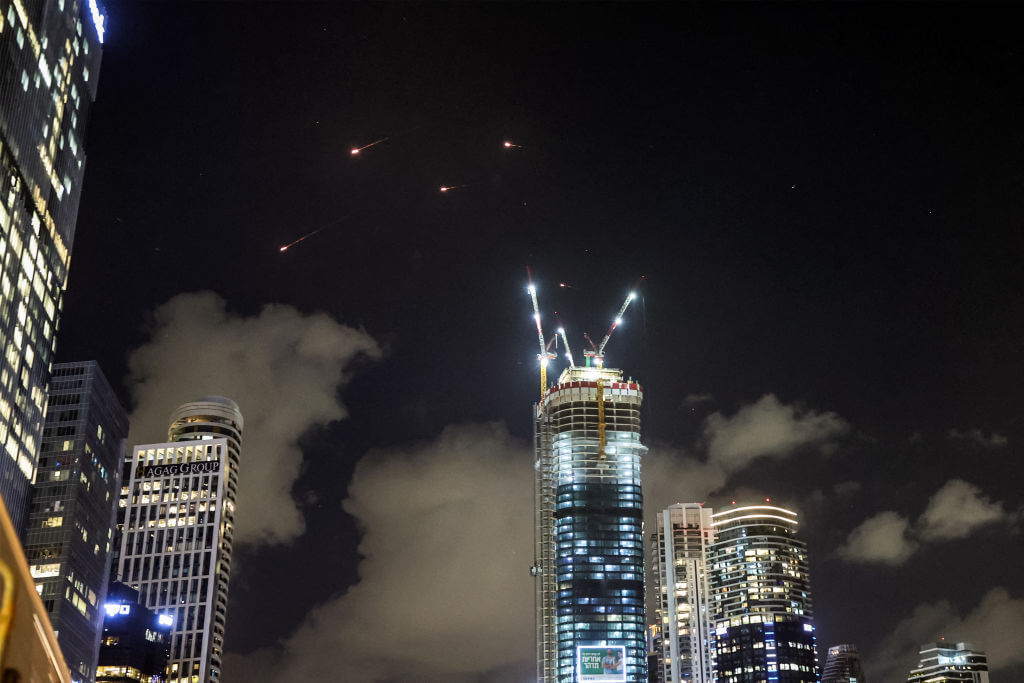Terror attack killed 7 in Israel as Iran launched missiles
Israel recently attacked Hezbollah in Lebanon, Houthis in Yemen

An Iranian missile attack over Tel Aviv on October 1. Photo by Jack Guez/AFP via Getty Images
Iran launched a barrage of missiles at Israel Tuesday, inflicting no serious casualties, Israeli officials reported. But as missiles rained down on Tel Aviv, two gunman killed 7 people in a terror attack at the light rail station in the Jaffa neighborhood.
All Israeli civilians are in bomb shelters as rockets from Iran are fired at Israel. pic.twitter.com/bKXPdqMsBr
— Israel Defense Forces (@IDF) October 1, 2024
The Israel Defense Forces said it intercepted “a large number” of the ballistic missiles, and was assisted by the U.S. in both their detection and interception, according to Times of Israel. Iran’s attack against Israel today was “about twice as large in terms of the number of ballistic missiles” compared to Iran’s April attack on Israel, said Pentagon spokesperson Maj. Gen. Pat Ryder. You “don’t launch that many missiles at a target without the intent of hitting something.”
“We do not perceive any further threats from Iran,” IDF spokesman Daniel Hagari said after the attack ended. He added, “There will be consequences for this shooting, we will respond in the right place and time.”
Iran said it would send more missiles if Israeli retaliated.
Police determined that a report of another terrorist attack at a hotel in Herzliya was a false alarm.
Why is Iran attacking Israel?
Iran has said the strikes are retaliation for the recent killing of Hezbollah leader Hassam Nasrallah in Beirut and the July killing of Hamas leader Ismail Haniyeh, who died in Tehran during an Israeli airstrike.
Israel has in the past day announced it was making limited ground incursions into southern Lebanon to root out pockets of Hezbollah fighters closest to Israel’s northern border. This followed an operation, widely attributed to Israel, in which thousands of Hezbollah militants were injured when their pagers exploded in their pockets. Hezbollah began launching rockets at Israel from Lebanon after Oct. 7 in support of Hamas in Gaza.
What is the ‘Axis of Resistance’?
The “Axis of Resistance” refers to Iran-backed militant groups, most of which have vowed to destroy Israel. The group includes Hezbollah in Lebanon, Iran’s largest proxy, which is also known as the world’s most heavily armed non-state group. It also includes Hamas in Gaza, the Houthis in Yemen, the Syrian government and groups of Iraqi militias.
In the past these groups have attacked Israel, but also other targets, including Saudi Arabia and U.S. interests in the Middle East. After Hamas’ Oct. 7 attack, these groups launched attacks of their own against Israel.
Will this attack set off a regional war in the Middle East?
Iran launched a direct attack on Israel for the first time in April, sending more than 170 drones, 30 cruise missiles and 120 ballistic missiles toward the Jewish state. Israel was able to intercept nearly all of them with the help of the U.S., France, Britain, Jordan, and Saudi allies. The US Defense Department described Tuesday’s attack as “twice the scope” of the April attack.
Iran’s attack at the time was a response to the killing of two of its top Iranian generals in Damascus. As on Tuesday, there were few casualties, and some experts argued that Iran felt the need to retaliate, but exercised restraint to avoid triggering a regional war.
Tensions in the region have continued to escalate since Oct. 7, when Hamas attacked Israel, killing about 1,200 people and taking about 240 people hostage, sparking a war in Gaza.
JTA contributed to this report.






















